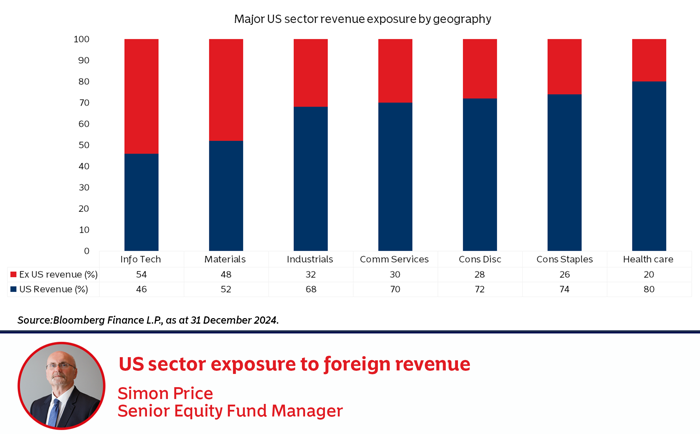
What this chart shows
This chart provides a breakdown of major US equity sectors, not including mostly domestic focused sectors, and their revenue sources, distinguishing between domestic and international sources as of December 2024. In aggregate, more than 54% of the tech sector's revenue came from abroad in 2024, making it the most exposed sector to international demand in the S&P 500. Its largest non-domestic market is China, accounting for nearly 14% of sales. This was followed by the materials sector, then industrials and communications, mostly due to Meta and Alphabet. The most insulated sector with over 80% of its revenue earned domestically is Health care, followed by staples and discretionary.
Why this is important
President Trump’s unveiling of his tariff package, which was substantially worse than expected, has brought tariff risks to the forefront for investors. There are significant concerns about the negative impacts on supply chains, consumer confidence, and corporate earnings. Tariffs are expected to slow down demand across various sectors due to increased costs being passed on to consumers. Companies may consider raising prices to offset these costs, which could reduce purchasing power and sales volumes. To mitigate the risks associated with tariffs, companies are exploring strategies such as diversifying supply chains, negotiating with vendors, adjusting product sourcing, and considering shifting manufacturing to manage costs and maintain competitiveness. Understanding industry structures within sectors, including the flexibility to shift production domestically, and pricing power is crucial in the investment decision-making process.
It is important especially in heightened risk environments, which now include increased tariffs to ensure that portfolios are resilient across various potential outcomes, rather than reacting to headlines.
The global financial landscape was significantly impacted by the US trade conflicts, leading to market volatility, altered trade relationships, and heightened economic uncertainty worldwide.

-
Financial markets swung sharply throughout the week as tariff announcements and retractions created investor uncertainty, with the S&P 500 ending the week in recovery mode after earlier losses.
-
President Trump announced that smartphones, computers and other key consumer electronics would be exempt from new tariffs on Chinese imports. The move was seen as an attempt to avoid further consumer price rises and calm tech investors.
-
Wall Street leaders including Larry Fink warned of an increased risk of recession, pointing to inflation pressures and growing concerns about policy unpredictability.
-
US bond markets experienced strong selloffs midweek before rebounding on Friday, reflecting investor anxiety over trade policy and economic outlook.

-
British trade officials focused on strengthening ties with the EU following increased friction with the US over tariff disputes.
-
Several high-profile IPOs in London were postponed or pulled as market volatility and US trade policy made conditions less attractive for new listings.
-
Andrew Bailey, Governor of the Bank of England, was named as the next chair of the Financial Stability Board, an international financial regulatory body, taking the post in July.
-
The Financial Policy Committee (FPC) of the Bank of England discussed intensified risks associated with the fragmentation of global trade and geopolitical tensions, highlighting potential harm to financial stability

-
The Euro strengthened significantly against the US Dollar, reaching its highest level since February 2022, driven by uncertainty surrounding the US economy and the trade war with China.
-
Major European indices fell sharply during the week, with the STOXX 600 suffering its worst performance in over a year.
-
EU policymakers used the moment to advocate for a renewed global push on multilateral trade and reduced protectionism.
-
European Commission President Ursula von der Leyen cautioned that the EU might impose new taxes on US tech companies like Google and Meta if trade negotiations with President Trump fail.

-
China's stock markets showed relative resilience, with the Shanghai Composite index falling only 0.6% in USD terms over the week, despite global market volatility triggered by trade tensions.
-
The Chinese government expanded controls on business dealings with key US companies, aiming to counteract US trade measures and protect domestic interests.
-
Japan's Nikkei 225 index declined by 4% in USD terms amid global market volatility driven by US tariff announcements and escalating trade tensions.
-
Global markets, including those in emerging economies, experienced heightened volatility as investors reacted to trade tensions and potential recession risks.
